Fleurs du Mal Magazine


Or see the index
Jakub Shapiro ist ein hoffnungsvoller junger Boxer und überhaupt sehr talentiert.
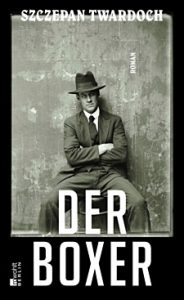 Das erkennt auch der mächtige Warschauer Unterweltpate Kaplica, der Shapiro zu seinem Vertrauten macht. Doch rechte Putschpläne gegen die polnische Regierung bringen das Imperium Kaplicas in Bedrängnis; er kommt in Haft, als ihm ein politischer Mord angehängt wird. Im Schatten dieser Ereignisse bricht ein regelrechter Krieg der Unterwelt los. Jakub Shapiro muss die Dinge in die Hand nehmen: Er geht gegen Feinde wie Verräter vor, beginnt – aus Leidenschaft und Kalkül – eine fatale Affäre mit der Tochter des Staatsanwalts, muss zugleich seine Frau und Kinder vor dem anschwellenden Hass schützen – und nimmt immer mehr die Rolle des Paten ein.
Das erkennt auch der mächtige Warschauer Unterweltpate Kaplica, der Shapiro zu seinem Vertrauten macht. Doch rechte Putschpläne gegen die polnische Regierung bringen das Imperium Kaplicas in Bedrängnis; er kommt in Haft, als ihm ein politischer Mord angehängt wird. Im Schatten dieser Ereignisse bricht ein regelrechter Krieg der Unterwelt los. Jakub Shapiro muss die Dinge in die Hand nehmen: Er geht gegen Feinde wie Verräter vor, beginnt – aus Leidenschaft und Kalkül – eine fatale Affäre mit der Tochter des Staatsanwalts, muss zugleich seine Frau und Kinder vor dem anschwellenden Hass schützen – und nimmt immer mehr die Rolle des Paten ein.
Der Aufstieg eines Verbrecherhelden zwischen Gewalt, Eleganz und Laster, seine Verletzlichkeit als Jude im Vorkriegs-Warschau: «Der Boxer» ist grandios angelegt und fast filmisch erzählt, ein Panorama mit Sportlern und Schurken, einem Mann mit zwei Gesichtern, glamourösen Huren und charismatischen Gangstern. Ein überragender, thrillerhafter Roman, der eine eruptive Epoche geradezu körperlich erlebbar macht.
Mit Szczepan Twardoch ist Polen zurück auf der Bühne der Weltliteratur.
-Die Welt
Szczepan Twardoch, geboren 1979, ist einer der herausragenden Autoren der polnischen Gegenwartsliteratur. Mit «Morphin» (2012) gelang ihm der Durchbruch, das Buch wurde mit dem Polityka-Passport-Preis ausgezeichnet, Kritik und Leser waren begeistert. Für den ebenfalls hochgelobten Roman «Drach» wurden Twardoch und sein Übersetzer Olaf Kühl 2016 mit dem Brücke Berlin Preis geehrt. Bei polnischen Lesern wie Kritikern übertraf «Der Boxer» diese Erfolge sogar noch. Szczepan Twardoch lebt mit seiner Familie in Pilchowice/Schlesien.
Szczepan Twardoch
Der Boxer
Übersetzt von: Olaf Kühl
Deutsche Erstausgabe
Hardcover
€22,95
Verlag: Rowohlt Berlin
464 Seiten
ISBN: 978-3-7371-0008-3
Erscheinungstermin: 24.01.2018
new books
fleursdumal.nl magazine
More in: - Book News, Archive S-T, Art & Literature News, Thrillers
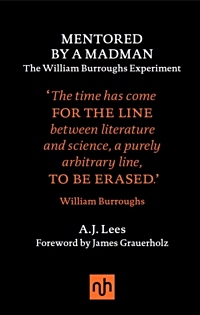 A fascinating account by one of the world’s leading neurologists of the profound influence of William Burroughs on his medical career.
A fascinating account by one of the world’s leading neurologists of the profound influence of William Burroughs on his medical career.
Lees relates how Burroughs, author of Naked Lunch and troubled drug addict, inspired him to discover a ground-breaking treatment for Parkinson’s Disease. Lees journeys to the Amazonian rainforest in search of cures, and through self-experimentation seeks to find the answers his patients crave. He enters a powerful plea for the return of imagination to medical research.
A fascinating personal account by one of the world’s leading neurologists of the profound influence of William Burroughs on his medical career. Lees journeys to the Amazonian rainforest in search of cures, and through self-experimentation seeks to find the answers his patients crave. ‘The inevitable comparison with the late, great Oliver Sacks is entirely just.’ – Professor Raymond Tallis
Mentored by a Madman:
The William Burroughs Experiment
by A.J. Lees (Author),
James Grauerholz (Foreword)
Hardcover
Pages: 236
$16.11
September 12, 2017
Series: Notting Hill Editions
ISBN: 9781910749104
new books
fleursdumal.nl magazine
More in: #Beat Generation Archives, - Book News, - Book Stories, Archive A-B, Art & Literature News, Burroughs, William S.
Op zondag 11 maart is de première van de documentaire Dichter tegen de tijd, een portret van Jasper Mikkers, te zien in de Nieuwe Vorst, Willem II-straat, Tilburg. Aanvang 16.00 uur. Na de vertoning vindt aldaar ook de presentatie plaats van zijn nieuwe bundel Nachtleven, met illustraties van Daisy Karthaus.
 Jasper Mikkers (Oerle, 1948) debuteerde in 1974 onder het pseudoniem Tymen Trolsky bij de Bezige Bij met de roman Hyacinta en Pasceline. Bij dezelfde uitgeverij verschenen later datzelfde jaar maar liefst drie dichtbundels .Na de onthulling van zijn pseudoniem in 1976 volgden nog vele publicaties, zowel onder de naam Tymen Trolsky als zijn echte naam. Naast dichtbundels onder meer het reisboek De weg van de regen (1990), de verhalenbundel De kleine jongen en de rivier (1994), en de romans Het einde van de eeuwigheid (2000) en Karl Marx Universiteit (2009).
Jasper Mikkers (Oerle, 1948) debuteerde in 1974 onder het pseudoniem Tymen Trolsky bij de Bezige Bij met de roman Hyacinta en Pasceline. Bij dezelfde uitgeverij verschenen later datzelfde jaar maar liefst drie dichtbundels .Na de onthulling van zijn pseudoniem in 1976 volgden nog vele publicaties, zowel onder de naam Tymen Trolsky als zijn echte naam. Naast dichtbundels onder meer het reisboek De weg van de regen (1990), de verhalenbundel De kleine jongen en de rivier (1994), en de romans Het einde van de eeuwigheid (2000) en Karl Marx Universiteit (2009).
In de periode 2013-2015 was hij stadsdichter van Tilburg; hierover schreef hij de bundel Gespiegelde stad (2015).
Nachtleven is de derde dichtbundel die hij publiceert bij de bibliofiele uitgeverij Brandon Pers, eerder verschenen Kwatrijnen (1979) en De landmeters van de keizer (2002).
Nachtleven is in meer dan een opzicht een opvallende bundel. Zoals de dichter zelf in het voorwoord schrijft: ‘Aanzet tot het schrijven van deze bundel lag in het idee dromen die regelmatig terugkwamen vast te leggen’. En wat deze uitgave zeker zo bijzonder maakt zijn de erin opgenomen tien prachtige aquarellen van Daisy Karthaus die aansluiten bij de thematiek van de tweeëntwintig sonnetten.
Nachtleven is een dichtbundel van Jasper Mikkers met tien aquarellen van Daisy Karthaus. Wilt u verzekerd zijn van een exemplaar van Nachtleven dan kunt u reserveren bij de secretaris van de Brandon Pers (via cvanraak@online.nl )
De prijs bedraagt euro 17,50 (excl. Porto) en de oplage is 140 exemplaren.
fleursdumal.nl magazine
More in: - Book Lovers, - Book News, Archive K-L, Archive M-N, Art & Literature News, Illustrators, Illustration, Jasper Mikkers, Mikkers, Jasper
For the first time in a quarter century, a major new volume of translations of the beloved poetry of Federico García Lorca, presented in a beautiful bilingual edition.
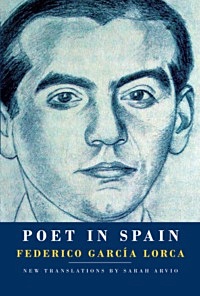 The fluid and mesmeric lines of these new translations by the award-winning poet Sarah Arvio bring us closer than ever to the talismanic perfection of the great García Lorca. Poet in Spain invokes the “wild, innate, local surrealism” of the Spanish voice, in moonlit poems of love and death set among poplars, rivers, low hills, and high sierras.
The fluid and mesmeric lines of these new translations by the award-winning poet Sarah Arvio bring us closer than ever to the talismanic perfection of the great García Lorca. Poet in Spain invokes the “wild, innate, local surrealism” of the Spanish voice, in moonlit poems of love and death set among poplars, rivers, low hills, and high sierras.
Arvio’s ample and rhythmically rich offering includes, among other essential works, the folkloric yet modernist Gypsy Ballads, the plaintive flamenco Poem of the Cante Jondo, and the turbulent and beautiful Dark Love Sonnets—addressed to Lorca’s homosexual lover—which Lorca was revising at the time of his brutal political murder by Fascist forces in the early days of the Spanish Civil War.
Here, too, are several lyrics translated into English for the first time and the play Blood Wedding—also a great tragic poem. Arvio has created a fresh voice for Lorca in English, full of urgency, pathos, and lyricism—showing the poet’s work has grown only more beautiful with the passage of time.
Federico Garcia Lorca may be Spain’s most famous poet and dramatist of all time. Born in Andalusia in 1898, he grew up in a village on the Vega and in the city of Granada.
His prolific works, known for their powerful lyricism and an obsession with love and death, include the Gypsy Ballads, which brought him far-reaching fame, and the homoerotic Dark Love Sonnets, which did not see print until almost fifty years after his death.
His murder in 1936 by Fascist forces at the outset of the Spanish Civil War became a literary cause célébre; in Spain, his writings were banned. Lorca’s poems and plays are now read and revered in many languages throughout the world.
Poet in Spain
By Federico Garcia Lorca
Translated by Sarah Arvio
Category: Poetry
Hardcover
Nov 07, 2017
576 Pages
$35.00
Published by Knopf
ISBN 9781524733117
new books
fleursdumal.nl magazine
More in: - Book News, Archive G-H, Archive G-H, Art & Literature News, Garcia Lorca, Federico, WAR & PEACE
Starend naar de rand van de pyjamabroek valt hem opeens op hoe vaal hij is van het vele wassen.
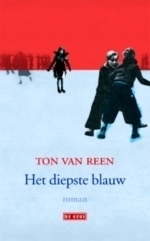 Het blauw is bijna wit.
Het blauw is bijna wit.
Hij zit te lang op de pot. Zijn rug wordt koud. Waarom klappen ze altijd met hun vliegtuig tegen de silo? Natuurlijk komt het door Tijger. Terwijl hij stuurt, zwaait hij naar zijn moeder.
Hij mag toch wel één keer naar China reizen? Één keer, al is het maar in een droom.
Zijn blaas is vol, maar het plassen lukt niet. Hij grinnikt als hij aan vroeger denkt. Toen piste hij over muren heen.
Ton van Reen: Het diepste blauw (028)
wordt vervolgd
fleursdumal.nl magazine
More in: - Book Stories, - Het diepste blauw, Archive Q-R, Reen, Ton van
`Ik wil geen blauwe broek’, roept Mels. `Ik wil een bruine, net als Tijger. En een rood hemd. Of geel. Of groen.’ `Je krijgt alleen blauw’, zegt zijn moeder kortaf. `Je bent toegewijd aan Maria.’
 Hij weet het. Hij heet Emilius Maria. Hij schaamt er zich een beetje voor dat hij een Mariakind is. Het is iets voor meisjes. Voor anderen probeert hij het geheim te houden. Of hij liegt erover. Emilius Michael, zegt hij als anderen naar zijn doopnamen vragen, maar ze twijfelen natuurlijk wel. Iedereen weet dat wie altijd in het blauw loopt, een Mariakind is.
Hij weet het. Hij heet Emilius Maria. Hij schaamt er zich een beetje voor dat hij een Mariakind is. Het is iets voor meisjes. Voor anderen probeert hij het geheim te houden. Of hij liegt erover. Emilius Michael, zegt hij als anderen naar zijn doopnamen vragen, maar ze twijfelen natuurlijk wel. Iedereen weet dat wie altijd in het blauw loopt, een Mariakind is.
`Paars mag ook’, zegt hij. `Of wit of zwart. Ik wil wat anders.’ Om dat eeuwige blauw heeft hij niet gevraagd.
`Het kan niet’, zegt zijn moeder. `Het is een belofte. Ik heb het Maria beloofd toen ik je onder mijn hart droeg. Een paar keer ging het bijna mis. Dat het leek of je te vroeg werd geboren. Ik was bang dat je een achterblijver zou worden. Toen heb ik die belofte gedaan.’
`Ik begrijp het’, zegt hij. Nu weet hij opeens waarom Tijger altijd van hem wint. Er is iets met hem. Hij is niet helemaal goed. Het komt door zijn moeder. Nog steeds is ze vaak ziek.
Tijger komt binnen. Hij ziet zijn teleurgestelde gezicht. Hij weet niet waarom, maar toch legt hij troostend een arm om Mels’ schouders.
`Het is vreselijk’, zegt Mels. `Ik zal nooit van je kunnen winnen. Toen ik werd geboren, was ik bijna dood.’
Tijger schrikt.
`Dan had ik je nooit gekend!’
`Ik weet het’, zegt Mels. `Jij bent mijn vriend.’
Zijn moeder kijkt hem verwijtend aan.
`Zo erg was het ook weer niet’, zegt ze, hoewel het als een verdediging klinkt. `Je was een beetje blauw, maar je woog zeven pond. Ik was er trots op dat ik, zo mager als ik altijd was, een baby van zeven pond op de wereld had gezet. Je mankeert niks.’
Ton van Reen: Het diepste blauw (027)
wordt vervolgd
fleursdumal.nl magazine
More in: - Book Stories, - Het diepste blauw, Archive Q-R, Reen, Ton van
Sie gilt als Künstlerin des sozialen Elends und der schmerzlichen Tragik des Krieges – Käthe Kollwitz.
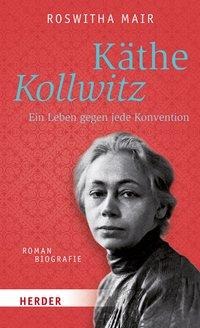 Fröhlich, unkonventionell, sinnlich, neugierig – all das ist sie Zeit ihres Lebens. Immer wieder bricht Kollwitz mit gängigen Konventionen. So reist die Mutter von zwei Kindern etwa 1904 alleine nach Paris – eigentlich undenkbar zu dieser Zeit -, um die Kunst des plastischen Gestaltens zu lernen. Dort trifft sie u.a. auf Rodin.
Fröhlich, unkonventionell, sinnlich, neugierig – all das ist sie Zeit ihres Lebens. Immer wieder bricht Kollwitz mit gängigen Konventionen. So reist die Mutter von zwei Kindern etwa 1904 alleine nach Paris – eigentlich undenkbar zu dieser Zeit -, um die Kunst des plastischen Gestaltens zu lernen. Dort trifft sie u.a. auf Rodin.
Als zu Beginn des Ersten Weltkrieges ihr Sohn ums Leben kommt, beherrscht dieses Trauma über viele Jahre ihr Leben wie auch ihre Kunst.1919 wird sie als erste Frau Professorin an der Preußischen Akademie der Künste, bis nach Hitlers Machtergreifung ein dunkler Schatten über das Land zieht und sich auch auf ihr Leben legt.
Eine tiefgründige Romanbiografie, die das außergewöhnliche Leben dieser beeindruckenden Künstlerin facettenreich einfängt.
Roswitha Mair, Dr. phil., ist Kunsthistorikerin und lebt in Innsbruck. Zahlreiche Veröffentlichungen und Beiträge zur Kunst des 20. Jahrhunderts sowie Organisation und Konzeption von Kunstausstellungen.
Roswitha Mair :
Käthe Kollwitz.
Ein Leben gegen jede Konvention.
Romanbiografie
‘Herder Spektrum Taschenbücher’
Herder Verlag GmbH
Juni 2017
231 Seiten
Kartoniert – Broschiert
Sprache: Deutsch
€16,00
EAN: 9783451069734
ISBN: 3451069733
new books
fleursdumal.nl magazine
More in: - Book News, Archive K-L, Archive M-N, Art & Literature News, Galerie Deutschland, Käthe Kollwitz, Sculpture, WAR & PEACE
The brilliant new novel from the Man Booker Prize-winning author of The Sense of an Ending. Would you rather love the more, and suffer the more; or love the less, and suffer the less? That is, I think, finally, the only real question.
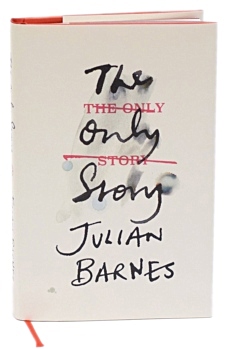 First love has lifelong consequences, but Paul doesn’t know anything about that at nineteen. At nineteen, he’s proud of the fact his relationship flies in the face of social convention.
First love has lifelong consequences, but Paul doesn’t know anything about that at nineteen. At nineteen, he’s proud of the fact his relationship flies in the face of social convention.
As he grows older, the demands placed on Paul by love become far greater than he could possibly have foreseen.
Tender and profound, The Only Story is an achingly beautiful novel by one of fiction’s greatest mappers of the human heart.
Julian Barnes is the author of twelve novels, including The Sense of an Ending, which won the 2011 Man Booker Prize for Fiction. He has also written three books of short stories, four collections of essays and two books of non-fiction, Nothing to be Frightened Of and the Sunday Times number one bestseller Levels of Life. In 2017 he was awarded the Légion d’honneur.
“Most of my friends were far-flung, and –
by some unexpressed but clear parental mandate –
use of the telephone was discouraged.
A letter, and then a letter in reply.
It was all slow-paced, and lonely.”
from: The Only Story
Julian Barnes is the author of twelve novels, includingThe Sense of an Ending, which won the 2011 Man Booker Prize for Fiction. He has also written three books of short stories, Cross Channel, The Lemon Table and Pulse; four collections of essays; and two books of non-fiction, Nothing to be Frightened Of and the Sunday Times Number One bestseller Levels of Life. He lives in London.
“A novel that quietly sinks its hooks into the reader and refuses to let go.” – The Times
Julian Barnes
The Only Story
Novel
Hardback, £16.99
224 pages
Publisher: Vintage Publishing
01 February 2018
ISBN: 9781787330696
new books
fleursdumal.nl magazine
More in: - Book News, Archive A-B, Art & Literature News, Julian Barnes
In this riveting, heartfelt debut, a young woman assumes a new name to escape her dark past and find the redemption she desperately seeks.
“A terrific debut, told gently, honestly, and with a generous amount of hope.”—New York Times bestselling author Jamie Ford
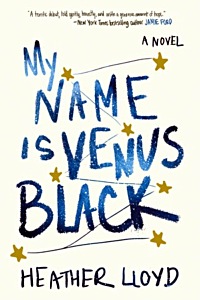 Venus Black is a straitlaced A student fascinated by the study of astronomy—until the night she commits a shocking crime that tears her family apart and ignites a media firestorm. Venus refuses to talk about what happened or why, except to blame her mother. Adding to the mystery, Venus’s developmentally challenged younger brother, Leo, goes missing.
Venus Black is a straitlaced A student fascinated by the study of astronomy—until the night she commits a shocking crime that tears her family apart and ignites a media firestorm. Venus refuses to talk about what happened or why, except to blame her mother. Adding to the mystery, Venus’s developmentally challenged younger brother, Leo, goes missing.
More than five years later, Venus is released from prison with a suitcase of used clothes, a fake identity, and a determination to escape her painful past. Estranged from her mother, and with her beloved brother still missing, she sets out to make a fresh start in Seattle, skittish and alone. But as new people enter her orbit—including a romantic interest and a young girl who seems like a mirror image of her former lost self—old wounds resurface, and Venus realizes that she can’t find a future while she’s running from her past.
In this gripping story, debut novelist Heather Lloyd brilliantly captures ordinary lives thrust into extraordinary circumstances. Told through a constellation of captivating voices, My Name Is Venus Black explores the fluidity of right and wrong, the pain of betrayal, and the meaning of love and family.
Heather Lloyd, who has spent many years working as an editor and writing coach, lives with her husband in New York City. My Name Is Venus Black is her first novel.
My Name Is Venus Black
A Novel
By Heather Lloyd
Category: Crime Mysteries
Hardcover : $27.00
Publ.: Feb 27, 2018
368 Pages
ISBN 9780399592188
Publ. by The Dial Press
new books
fleursdumal.nl magazine
More in: - Book News, Archive K-L, Art & Literature News, BIOGRAPHY, CRIME & PUNISHMENT, Tales of Mystery & Imagination
In the language of fan fiction, a ‘Mary Sue’ is an idealised and implausibly flawless character: a female archetype that can infuriate audiences for its perceived narcissism.
 Such is the setting for this brilliant and important debut by Sophie Collins. In a series of verse and prose collages, Who Is Mary Sue? exposes the presumptive politics behind writing and readership: the idea that men invent while women reflect; that a man writes of the world outside while a woman will turn to the interior.
Such is the setting for this brilliant and important debut by Sophie Collins. In a series of verse and prose collages, Who Is Mary Sue? exposes the presumptive politics behind writing and readership: the idea that men invent while women reflect; that a man writes of the world outside while a woman will turn to the interior.
Part poetry and part reportage, at once playful and sincere, these fictive-factive miniatures deploy original writing and extant quotation in a mode of pure invention. In so doing, they lift up and lay down a revealing sequence of masks and mirrors that disturb the reflection of authority.A work of captivation and correction, this is a book that will resonate with anyone concerned with identity, shame, gender, trauma, composition and culture: everyone, in other words, who wishes to live openly and think fearlessly in the modern world.
Who Is Mary Sue? is a work for our times and a question for our age: it is a handbook for all those willing to reimagine prescriptive notions of identity and selfhood.
Sophie Collins is cofounder of tender, an online quarterly promoting work by female-identified writers and artists. She is carrying out research on poetry and translation at Queen’s University Belfast. Collins grew up in Bergen, North Holland, and now lives in Edinburgh. She is co-editor of tender, an online arts quarterly, and editor of Currently & Emotion (Test Centre, 2016), an anthology of contemporary poetry translations. small white monkeys, a text on self-expression, self-help and shame, was published by Book Works in 2017 as part of a commissioned residency at Glasgow Women’s Library.
Sophie Collins
Who Is Mary Sue?
8 February 2018
Published by Faber & Faber
Paperback
£10.99
112 pages
ISBN: 9780571346615
Poetry and prose
new books
fleursdumal.nl magazine
More in: - Book News, Archive C-D, Archive C-D, Art & Literature News, EDITOR'S CHOICE, LITERARY MAGAZINES
Just in time for his 99th birthday, New Directions is proud to present a swift, terrific chronological selection of Lawrence Ferlinghetti’s greatest poems.
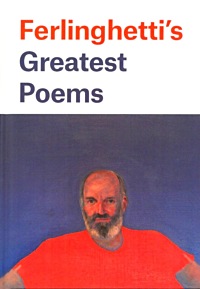 Through this tight lens, it is now possible to see Ferlinghetti—a brilliant and prolific poet—in a richer, broader, and more complex way. From his very first landmark books—Pictures of the Gone World (City Lights, 1955) and A Coney Island of the Mind (New Directions, 1958)—to new work, Ferlinghetti’s Greatest Poems displays every stage of this multifaceted writer’s long and celebrated career. It’s exciting to revisit in one slender volume so much of the splendid, playful, and trenchant work of one of America’s greatest and most popular poets.
Through this tight lens, it is now possible to see Ferlinghetti—a brilliant and prolific poet—in a richer, broader, and more complex way. From his very first landmark books—Pictures of the Gone World (City Lights, 1955) and A Coney Island of the Mind (New Directions, 1958)—to new work, Ferlinghetti’s Greatest Poems displays every stage of this multifaceted writer’s long and celebrated career. It’s exciting to revisit in one slender volume so much of the splendid, playful, and trenchant work of one of America’s greatest and most popular poets.
“A brave man and a brave poet.”––Bob Dylan
Lawrence Ferlinghetti, poet and founder of City Lights Books, author of A Coney Island of the Mind and Pictures of the Gone World, among numerous other books, has been drawing from life since his student days in Paris where he frequented the Academie Julien and where he did his first oil painting.
“Lawrence gets you laughing and then hits you with the truth.”––Francis Ford Coppola
Title: Ferlinghetti’s Greatest Poems
Author: Lawrence Ferlinghetti
Edited by Nancy J. Peters
Publisher New Directions Publishing Corporation
Format Hardcover, $16.95
144 pp.
ISBN-10 081122712X
ISBN-13 9780811227124
Publication Date 21 November 2017
new poetry books
fleursdumal.nl magazine
More in: #Beat Generation Archives, - Book News, - Bookstores, Archive E-F, Archive E-F, Art & Literature News
Angst beheerst zijn nachten. Nachtmerries. Vreemde dromen die voortduren als hij wakker is. Waarom komen er steeds van die krankzinnige verhalen in hem op? Het plafond als een allesverzwelgende zee. Maar ook al is hij helemaal wakker, toch kan hij het rare verhaal over verdrinkende steden en dorpen en de later opnieuw verdampende zee niet van zich afzetten.
 Als kind al beleefde hij van die wonderlijke verhalen. Vaak was hij een reus. De sterkste. Om zichzelf te bewijzen. Omdat hij groter en sterker wilde zijn dan Tijger, die meestal vlugger en gehaaider was. Sterker willen zijn was lijfsbehoud.
Als kind al beleefde hij van die wonderlijke verhalen. Vaak was hij een reus. De sterkste. Om zichzelf te bewijzen. Omdat hij groter en sterker wilde zijn dan Tijger, die meestal vlugger en gehaaider was. Sterker willen zijn was lijfsbehoud.
Het is iets in zijn hoofd. Zijn hele leven al komen er de vreemdste dingen in hem op. Zijn fantasieën brengen hem overal, maar zelden naar hier, naar dit vertrek, waar hij altijd alleen is.
Hij vouwt zijn kussen dubbel, probeert overeind te komen om de kamer te overzien.
Het irriteert hem dat de deur van de slaapkamer openstaat. Hij slaapt altijd met de deur open, niet omdat hij dat wil, maar omdat Lizet te beroerd is om de deur dicht te doen. Ze zegt dat ze hem dan beter kan horen als er ‘s nachts iets mis is. Met die deur open is hij nooit helemaal alleen. In huis hoort hij alles, ‘s nachts zelfs het druppelen van de kraan in de keuken. Tot hij er gek van wordt.
Het is pas half acht. Hij moet nodig plassen, maar hij moet nog een half uur geduld hebben, voordat Lizet hem uit bed haalt en hem naar het toilet brengt: het aangepaste toilet met hoge pot en handgrepen, ingebouwd in de kleine badcel die in een hoek van zijn slaapkamer is gemaakt. In geval van hoge nood kan hij in de fles plassen, maar dat doet hij liever niet. Lizet vindt het niet prettig om de fles schoon te maken. Dat ziet hij aan haar gezicht, die enkele keer dat het niet anders kan. Het gebeurt soms, als hij voor het slapen gaan bier heeft gedronken. Hij heeft geen zin in toestanden. Ruzie moet hij voorkomen. Dan maar geen bier.
Eindelijk rinkelt de wekker. Acht uur. Hij zet hem af. Direct daarna klinkt het hoge rammelen van de wekker op Lizets kamer. Haar dansende wekker staat in een soepbord vol muntjes. Even later hoort hij haar uit haar kamer komen. Haar sloffende stappen op de overloop. Hij sluit zijn ogen.
`Waarom word je altijd schreeuwend wakker?’ zegt ze, de kamer binnenkomend.
Hij kan nu niet meer doen of hij slaapt en opent zijn ogen opnieuw. In haar kamerjas staat ze naast zijn bed.
`Ik heb vreselijk gedroomd.’
`Je hebt een slecht geweten.’
Hij zegt er maar niets op. Hij zou gaan schreeuwen. Nooit vertelt hij haar iets over zijn dromen. Lizet ergert zich nog steeds aan Thija. Hij weet het. Eén keer, een paar jaar geleden, heeft hij verteld van het vliegtuig dat tegen de silo vloog. Hij vertelde het toen aan zijn kleindochter. Afke was een jaar of tien. Hij was pas een paar maanden thuis uit het revalidatiecentrum. Lizet had het toevallig gehoord. Ze had hem uitgelachen. Ze vond zijn droom belachelijk, de droom van een kind. Misschien, maar dat had ze waarschijnlijk niet durven zeggen, had ze gedacht dat hij na dat ongeluk weer een kind was geworden. Dat ze hem als een kind thuis had gekregen. Een lastig kind, dat kort gehouden moest worden en dat zelf niet mocht bepalen wanneer het uit bed werd gehaald en verzorgd.
Lizet loopt naar het toilet. Zoals gewoonlijk vergeet ze de deur achter zich te sluiten. Sinds de badcel met toilet op zijn kamer is, gebruikt zij het ook, en daarom haat hij het. Hij hoort de straal tegen de pot. Het maakt hem razend. `Waarom sluit je de deur niet!’ wil hij roepen, maar hij roept niet. Ze is hem de baas.
Haar ochtendjas goed trekkend, komt ze naar buiten. Ze drukt op de knop om het hoofdeinde van zijn bed recht te zetten, slaat de deken terug, tilt zijn benen uit bed en schuift hem in één beweging in de rolstoel.
`Tandenpoetsen.’
`Eerst naar het toilet. Ik moet nodig.’
`Vandaag wil je eerst dit, morgen wil je eerst dat.’ Haar stem is hoog van ergernis.
Ze rolt hem naar het toilet. Hij kan zelf uit de rolstoel op de pot schuiven. Omdat hij zijn armen sterk houdt. Het zou een te grote vernedering voor hem zijn om ook nog door haar op de pot te worden gezet. Of zal hij als het zover komt, om te overleven, weer opnieuw zijn grens verleggen? Eerder had hij het plan er een eind aan te maken als hij zichzelf niet meer kon aankleden. Maar toen het zover was, had hij uitvluchten gezocht om toch te blijven leven. Om voor iemand te leven. Gelukkig was Afke er. Voor haar verlegt hij zijn grens steeds verder naar beneden.
Afke herinnert hem aan Marjan als kind. Toen ze samen alles deden. Roeien op de Wijer. Door de bossen hollen en verstoppertje spelen. Jammer dat hij dat met Afke niet kan. Hij kan geen meter lopen. Hij kan nooit meer door de modder spatten. Nooit meer het zachte mos onder zijn blote voeten voelen. De spitse dennennaalden, het was fijn om bij het lopen pijn aan zijn voeten te voelen. Zijn lichaam wilde weten dat het op voeten gedragen werd. Dat hij juist zijn voeten moest verliezen! Als hij denkt aan de wandelingen door de bossen, voelt hij de pijn nog. Fantoompijn. De tinteling die door zijn hele lijf trok als de naalden in zijn voeten staken. Het deed hem goed.
Hij wacht op Lizet, die voor de spiegel wat aan haar haar doet. Eindelijk verlaat ze de badcel. Voorzichtig glijdt hij, de armen geklemd rond de dragers, op de pot en schuift de pyjamabroek over zijn benen.
Altijd draagt hij blauwe pyjama’s. Blauwe hemden. Blauwe broeken. Blauwe pakken. Als kind wilde hij het niet. Later wist hij niet beter meer. Aan hem bleef alles blauw. De kleur van water. Van de Wijer. Hij kan niet meer leven zonder blauw.
Ton van Reen: Het diepste blauw (026)
wordt vervolgd
fleursdumal.nl magazine
More in: - Book Stories, - Het diepste blauw, Archive Q-R, Reen, Ton van
Thank you for reading Fleurs du Mal - magazine for art & literature